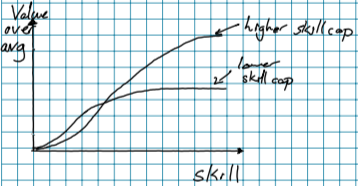EDIT: I'm only going to answer a few more questions, due to time constraints. I might eventually come back and answer more. I still appreciate getting replies with people's thoughts on things I've written.
I'm going to do an AMA on Tuesday next week (November 19th). Below I've written a brief description of what I'm doing at the moment. Ask any questions you like; I'll respond to as many as I can on Tuesday.
Although I'm eager to discuss MIRI-related things in this AMA, my replies will represent my own views rather than MIRI's, and as a rule I won't be running my answers by anyone else at MIRI. Think of it as a relatively candid and informal Q&A session, rather than anything polished or definitive.
----
I'm a researcher at MIRI. At MIRI I divide my time roughly equally between technical work and recruitment/outreach work.
On the recruitment/outreach side, I do things like the following:
- For the AI Risk for Computer Scientists workshops (which are slightly badly named; we accept some technical people who aren't computer scientists), I handle the intake of participants, and also teach classes and lead discussions on AI risk at the workshops.
- I do most of the technical interviewing for engineering roles at MIRI.
- I manage the AI Safety Retraining Program, in which MIRI gives grants to people to study ML for three months with the goal of making it easier for them to transition into working on AI safety.
- I sometimes do weird things like going on a Slate Star Codex roadtrip, where I led a group of EAs as we travelled along the East Coast going to Slate Star Codex meetups and visiting EA groups for five days.
On the technical side, I mostly work on some of our nondisclosed-by-default technical research; this involves thinking about various kinds of math and implementing things related to the math. Because the work isn't public, there are many questions about it that I can't answer. But this is my problem, not yours; feel free to ask whatever questions you like and I'll take responsibility for choosing to answer or not.
----
Here are some things I've been thinking about recently:
- I think that the field of AI safety is growing in an awkward way. Lots of people are trying to work on it, and many of these people have pretty different pictures of what the problem is and how we should try to work on it. How should we handle this? How should you try to work in a field when at least half the "experts" are going to think that your research direction is misguided?
- The AIRCS workshops that I'm involved with contain a variety of material which attempts to help participants think about the world more effectively. I have thoughts about what's useful and not useful about rationality training.
- I have various crazy ideas about EA outreach. I think the SSC roadtrip was good; I think some EAs who work at EA orgs should consider doing "residencies" in cities without much fulltime EA presence, where they mostly do their normal job but also talk to people.


Here are two logically inconsistent principles that could be true:
Don't Make Things Worse: If a decision would definitely make things worse, then taking that decision is not rational.
Don't Commit to a Policy That In the Future Will Sometimes Make Things Worse: It is not rational to commit to a policy that, in the future, will sometimes output decisions that definitely make things worse.
I have strong intuitions that the fist one is true. I have much weaker (comparatively neglible) intuitions that the second one is true. Since they're mutually inconsistent, I reject the second and accept the first. I imagine this is also true of most other people who are sympathetic to R_CDT.
One could argue that R_CDT sympathists don't actually have much stronger intuitions regarding the first principle than the second -- i.e. that their intuitions aren't actually very "targeted" on the first one -- but I don't think that would be right. At least, it's not right in my case.
A more viable strategy might be to argue for something like a meta-principle:
The 'Don't Make Things Worse' Meta-Principle: If you find "Don't Make Things Worse" strongly intuitive, then you should also find "Don't Commit to a Policy That In the Future Will Sometimes Make Things Worse" just about as intuitive.
If the meta-principle were true, then I guess this would sort of imply that people's intuitions in favor of "Don't Make Things Worse" should be self-neutralizing. They should come packaged with equally strong intuitions for another position that directly contradicts it.
But I don't see why the meta-principle should be true. At least, my intuitions in favor of the meta-principle are way less strong than my intutions in favor of "Don't Make Things Worse" :)